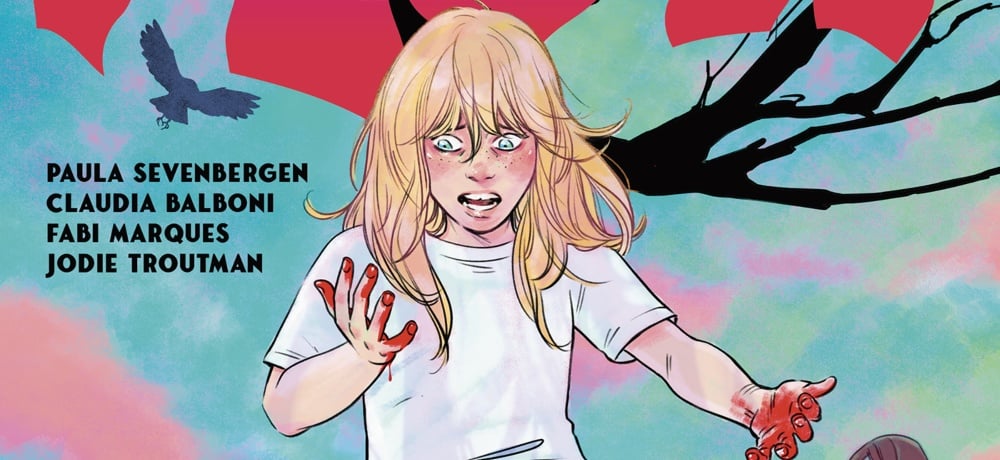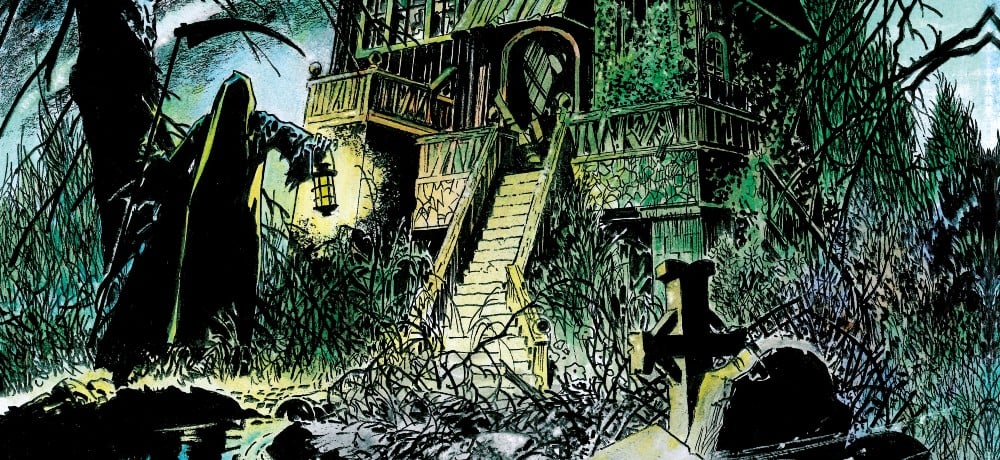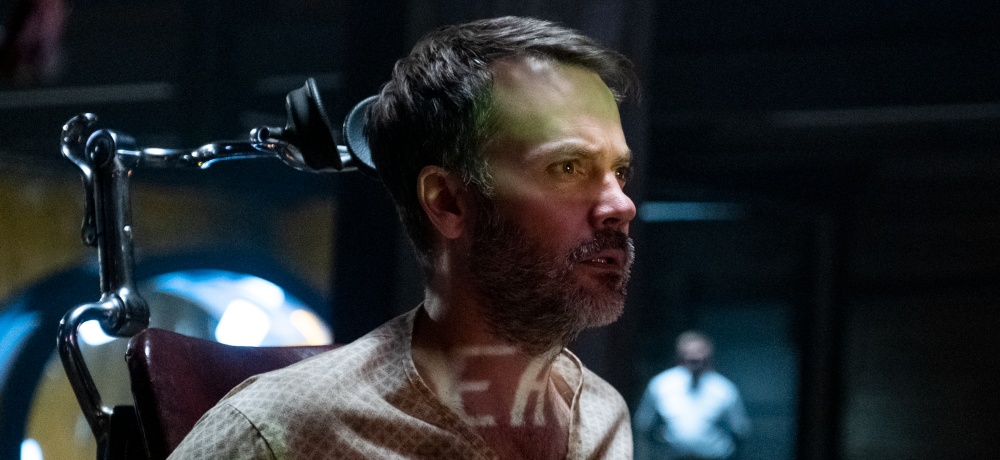






Having worked as a speechwriter at Washington, D.C., Alston Ramsay has unique insights into the world of politics under both the George W. Bush and Barack Obama administrations, making him the perfect person to write The Current Occupant, which follows a psychiatric ward patient who believes he's the President of the United States. The latest entry in Blumhouse and Hulu's Into the Dark series, and directed by Alston's brother Julius, The Current Occupant is now streaming on Hulu, and we caught up with Alston in our latest Q&A feature to discuss how his real world experience in politics (including a year spent in Afghanistan) shaped him as a writer, teaming up with his brothers to make movies, and the films and TV series that influenced the institutionalized horror of The Current Occupant.
Thanks for taking the time to catch up with us, and congratulations on Into the Dark: The Current Occupant! How and when did you first come up with the idea for this film?
Alston Ramsay: The Current Occupant came together through a series of events that brought the idea to life. My brother Julius Ramsay is a genre director, having worked on numerous groundbreaking shows, from Alias and Battlestar Galactica to The Walking Dead and The Purge (also for Blumhouse).
We were aware of the Into the Dark series, and it turns out their July 2020 slot was open (for those who don’t know, the series has a holiday theme for each month). So it was clearly an opportunity to leverage my background in politics as a speechwriter in Washington, D.C., to hit July 4th with my brother’s deep background in genre.
As we discussed various ideas, we realized we both had always wanted to make an institutional horror film—and this was the perfect opportunity to do that. Especially if we could come up with a story about the President of the United States since, to our knowledge, no one has ever made a horror film specifically about the President.
From there, we were off to the races!
How long did it take you to write the first draft of the screenplay, and how many drafts did you go through before it was time to film?
Alston Ramsay: My brother and I hashed out large portions of the overall structure as part of the pitch, and then we further refined those together before I actually started writing. The pitch took a couple weeks to develop, and then it was another few weeks to flesh everything out. At that point, most of the scenes and major beats were on notecards or included in a ten-page pitch document.
There were obviously some blind spots—and a lot changes occur as characters come to life through the actual writing process. But there was a roadmap, and when I have a roadmap, I’m a very fast writer—so the first draft itself only took six or seven days, which included one day just to go through and clean up. That was a rough draft that I then put in front of Julius for his high-level notes, which I incorporated before we started working through the Blumhouse and Hulu notes process.
All told, before we started shooting, there were probably around ten drafts, which includes changes we made once we started nailing down locations and actors and addressing other production realities.
You have previous experience working as a speechwriter in Washington D.C. Looking back, what was that part of your life like, and how did those experiences influence The Current Occupant and your writing process as a whole?
Alston Ramsay: There are times where that part of my life seems a bit like a dream since I had such an amazing time and worked with incredibly dedicated public servants—especially the men and women in uniform, since I was at the Pentagon writing for the Secretary of Defense. Throughout those five years, I witnessed and experienced history in the making: the wars in Iraq and Afghanistan, two presidential administrations, and I also spent a year in Afghanistan on the commanding general’s staff. It’s hard to describe since it was so foundational both to my writing, but also to who I am as a person and all my views on politics, national security, and our responsibilities as citizens in a republic.
The experiences shaped my writing in general since it was years and years of practice—and in particular, studying the spoken form of the language since that’s what speechwriting is all about: the rhythms, the cadence, the way different people speak. I didn’t realize the parallel with screenwriting until later on when I made the switch, but that’s obviously at the heart of good dialogue and character design.
All those experiences definitely shaped The Current Occupant in myriad ways. Being in the positions I was in, I spent a lot of time thinking about the nature of power and the philosophical ideas at the root of national security and America’s role in the world. Those discussions really flow through The Current Occupant in the Sessions—our series of mind deprogramming scenes—when the doctor is asking questions that really are at the root of the types of life-and-death decisions real leaders have to make on a daily basis.
What has it been like to transition from the political world to the world of filmmaking?
Alston Ramsay: Overall it’s been a very rewarding experience. I grew up as a film buff and watched as my older brother’s career progressed in Hollywood and he had the chance to work on some of my favorite TV shows. Talk about a fanboy who gets the inside scoop! Even if, occasionally, that entailed a spoiler, like the time I accidentally saw a notecard in his office that revealed the final Cylon in BSG… ouch.
It’s a less structured industry, which can be very positive, but presents its own challenges. Nothing beats the creative freedom of writing where the sky is the limit. But it’s certainly not an easy industry, and one has to develop a thick skin since there are 99 “no’s” for every “yes.”
D.C. was also great prep for the non-creative aspects of the business: how you work in teams where there are many great ideas and voices, how to make sure everyone is working toward a common purpose. Speechwriting is very similar because you’re working on a team and there’s input coming from many sources. So a large part of the job is to coordinate people and get them all rowing in the same direction.
Did you base the President of the United States in The Current Occupant on any particular President or political figure from real life, or is he a combination of different influences?
Alston Ramsay: First of all, I’d probably point out that it’s an open question in the film whether Henry Cameron is, in fact, the President of the United States. That’s the central spine of the film.
But no, he is not modeled on a specific President. He’s more modeled on general ideas of the presidency, like how you have to be somewhat of a megalomaniac to even run for the office since it means you think you’re capable of wielding that kind of power. Or that the sheer weight of responsibility is enough to drive anyone crazy.
I think the real credit on this character has to go to Barry Watson, the actor who portrayed him. He brought so much more to the character than was ever on the page—and created an incredibly complex, rich human being whose vulnerability is really what makes the character work on so many levels.
The Current Occupant is directed by your brother, Julius, who also directed your screenplay for Midnighters. What has it been like to work with your brother to bring these stories to life? Do you two have a shorthand when it comes to collaborating?
Alston Ramsay: Making a movie is in some respects like going to war: you have to 100 percent trust in the people who will be in the foxhole with you. And there’s no one else who fits that bill better than my brothers (there’s a third Ramsay brother who was an executive producer on Midnighters).
On the writing front, I’m extremely lucky to work with a sibling director because it means I know the director is always going to really listen to what I have to say. I also have the confidence that he’s going to do an amazing job since a) I’m his biggest fan as a director and b) I write the scripts as I’m having discussions with him about how he wants to direct it, the tone he wants, and so forth. So the script is almost reverse-engineered to set him up for success without having to be reinterpreted entirely (which can happen in a linear process where a script is commissioned, then a director is brought on).
As a producer, I’m also fortunate to work with a director who trusts my instincts and background on more granular business matters. I earned an MBA in business school and have spent time in the start-up and corporate worlds. Making movies is never a purely creative endeavor—it is a business, after all—so that’s another element I bring to the table with our package.
On the creative front, where the rubber really meets the road, we’re in almost complete lockstep. And I think that’s in large part because we do have a shorthand borne out of having almost identical sensibilities and very similar tastes. Whether the script, or on set, I can say it’s like that time in insert-obscure-scene-in-obscure-film, and he’ll instantly know what I’m trying to say without my having to explain it. And he’ll know exactly how to accomplish that as a director since I can throw out ideas without knowing how to actually execute them.
Were you influenced or inspired by any other conspiracy/political thrillers or psychological horror movies when you were writing the script for The Current Occupant?
Alston Ramsay: Oh yeah, there’s a ton of inspiration from many sources. I strongly believe one has to really research a genre or type of movie before trying to do something in that space. The Current Occupant is an institutional horror film, and so I started with the broader genre of institutional films since they have the same broader themes that are then amplified in horror.
For institutional films, I looked to Cool Hand Luke, One Flew Over the Cuckoo’s Nest, and of course the masterful Shawshank Redemption, which I can probably recite line by line (Julius worked with Frank Darabont on The Walking Dead). American Horror Story: Asylum is probably the best, most expansive exploration of purely institutional horror. On the political front, I looked to some of the older paranoid political thrillers like Manchurian Candidate, Three Days of the Condor, and Parallax View. There are obviously influences from A Clockwork Orange, and I also learned quite a bit breaking down films where it’s a spiraling, unstable narrator in whose head the film largely takes place, with Pi, Fight Club, and Taxi Driver at the top of that list.
There’s obviously a lot going on with politics and society right now in the United States. Ultimately, do you hope viewers take away any messages or real-life parallels from The Current Occupant?
Alston Ramsay: I think good drama and good fiction falls apart if there’s a really clear message that overrides the story itself—you know, where it kind of whacks you over the head. So no, I don’t have a specific message I want anyone to walk away with.
Obviously, just given the nature of the content—a guy in a bizarre psychiatric hospital who thinks he’s the President—there are many themes swirling under the surface relevant both to the current insane political moment and also to my firsthand knowledge of having seen power and powerbrokers up close and personal at the highest levels of government.
I do think the genre of institutional horror has a direct bearing on what we’re all going through: trapped by a disease ravaging the country and held hostage by decisions made by national leaders who—let’s be honest—have personal ulterior motives that are undermining our collective response. Institutional horror films are about being trapped, about the destruction of willpower and agency, about unthinking, uncaring bureaucracies that apply power on a whim. Given that, it’s impossible to escape the relevance of the film at this particular moment.
What has it been like to join Blumhouse and Hulu’s Into the Dark family with The Current Occupant?
Alston Ramsay: You’re always asking a lot for someone to take a chance on you and your vision, and I’ll be forever grateful that Blumhouse did that with The Current Occupant. The Into the Dark series is unique, blending the TV model with feature films. For a filmmaker, it’s a great opportunity to come in and make a feature film that has an air date in the very near future. Most features take years from idea to screen, but in this case the total time is only seven or eight months since they’ve already built the production train and you’re hopping aboard for a few stops. It’s an intense timeline, to be sure, but there’s also the benefit in how it focuses you so much. Failure really isn’t an option. Luckily, there’s a great production team at Into the Dark in place to make sure you succeed.
With The Current Occupant now on Hulu, what other projects do you have coming up that you’re excited about, and where can our readers follow your work online?
Alston Ramsay: Julius and I are out pitching a new TV series. I don’t want to say much about it, but it’s a new genre of television that will blow you away... how’s that for a tease?
One of these days, I’ll get around to making a vanity website, but until then I’m around on Facebook and Instagram, although not super-active.